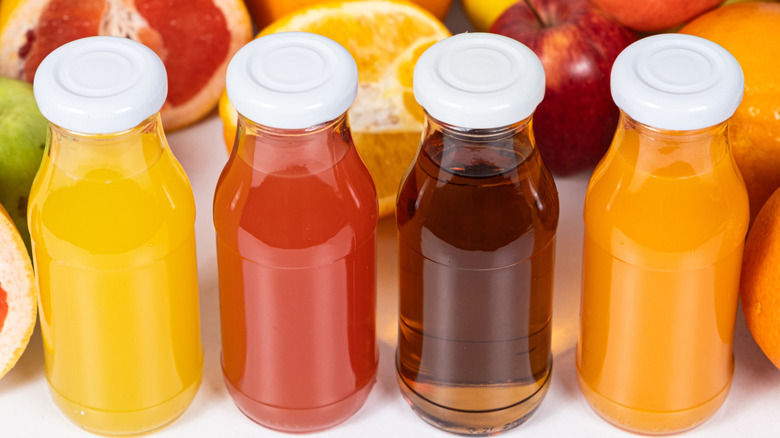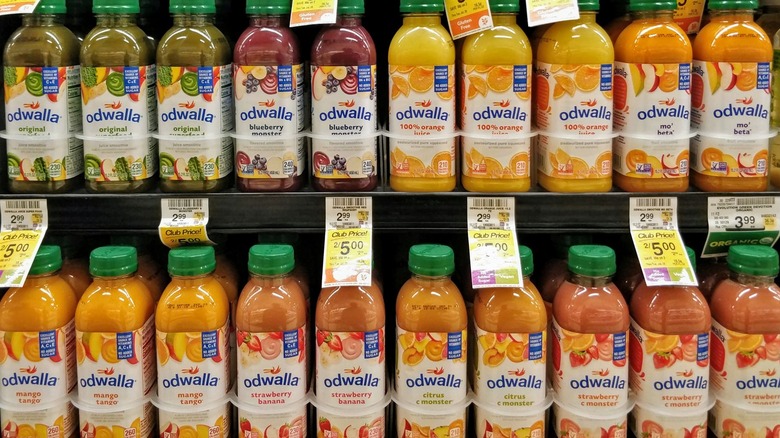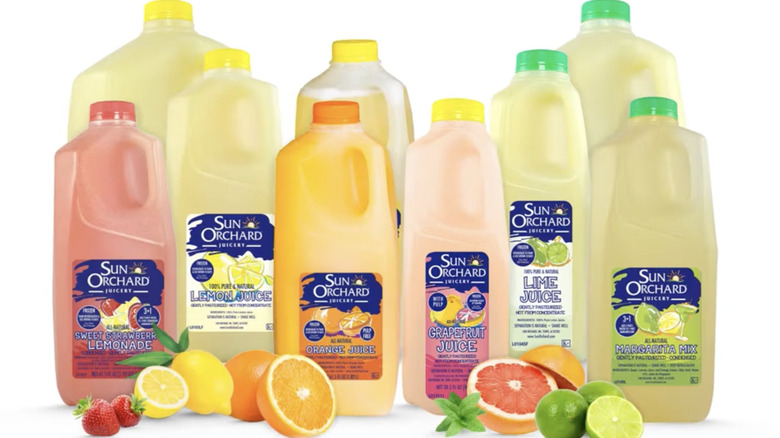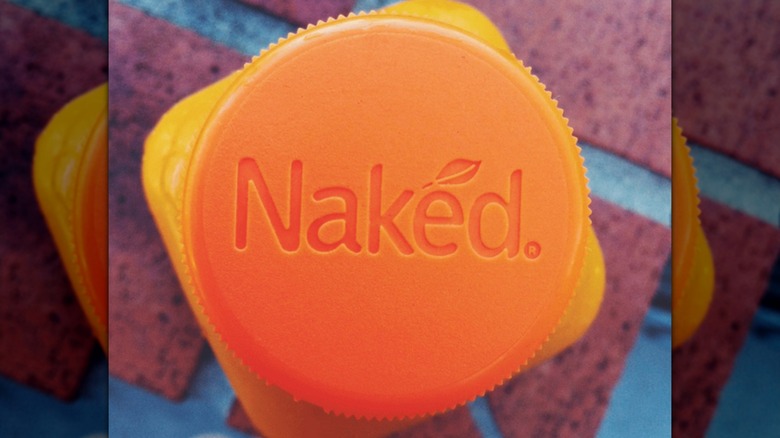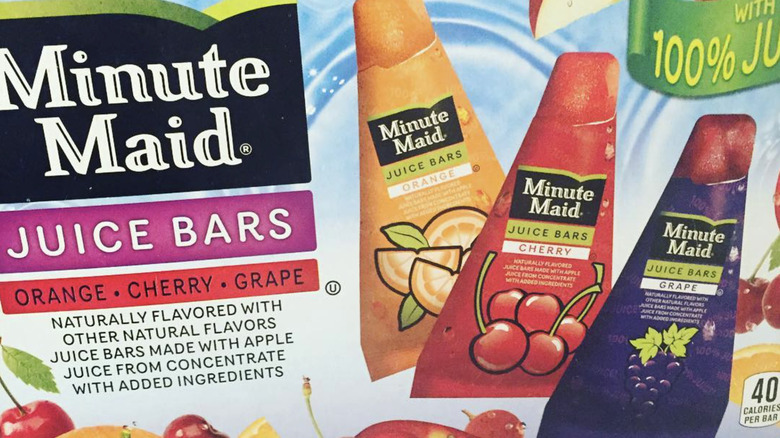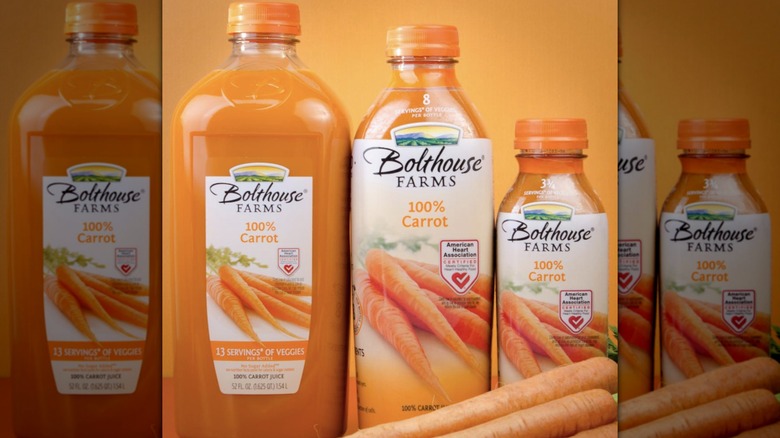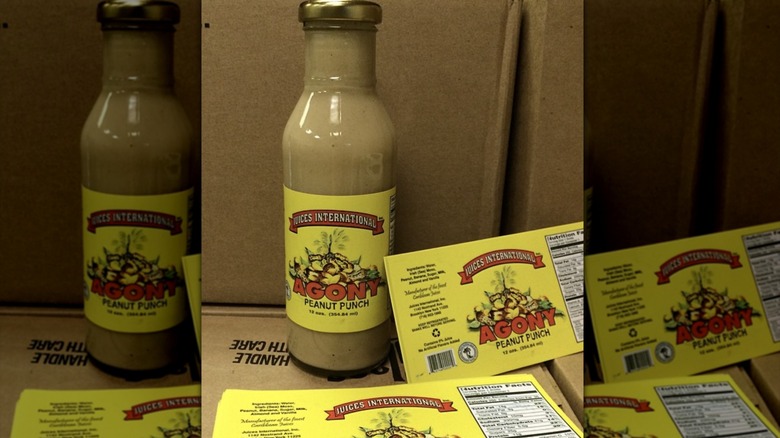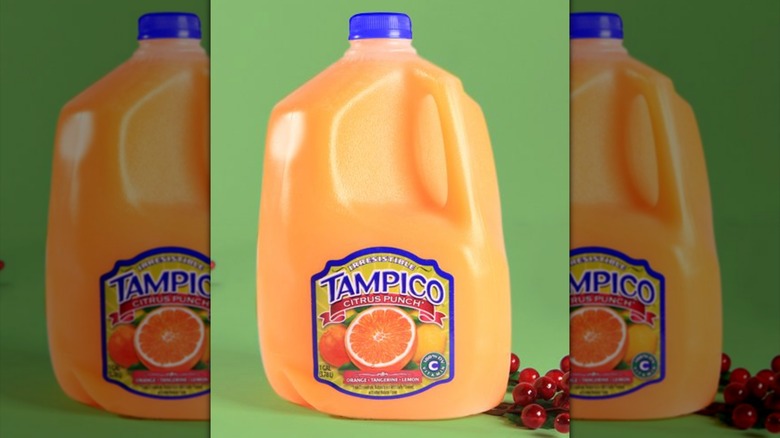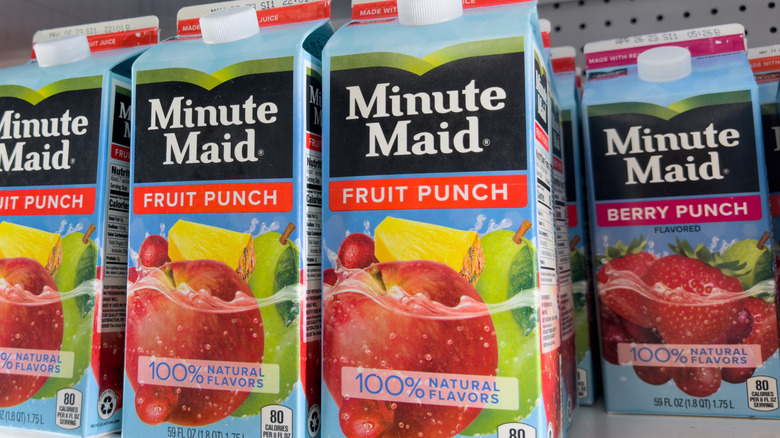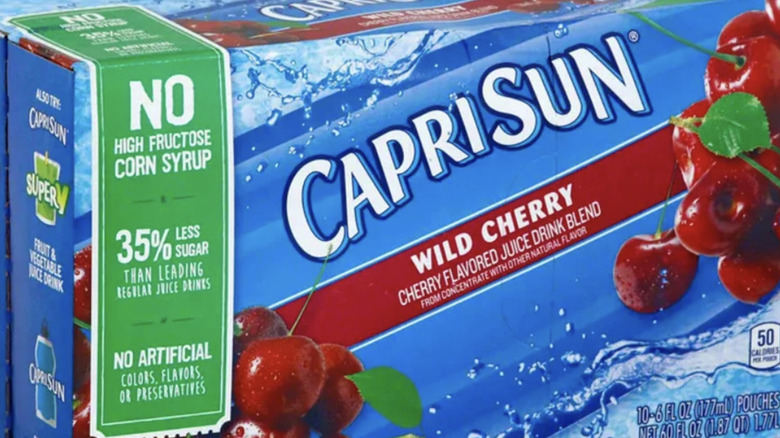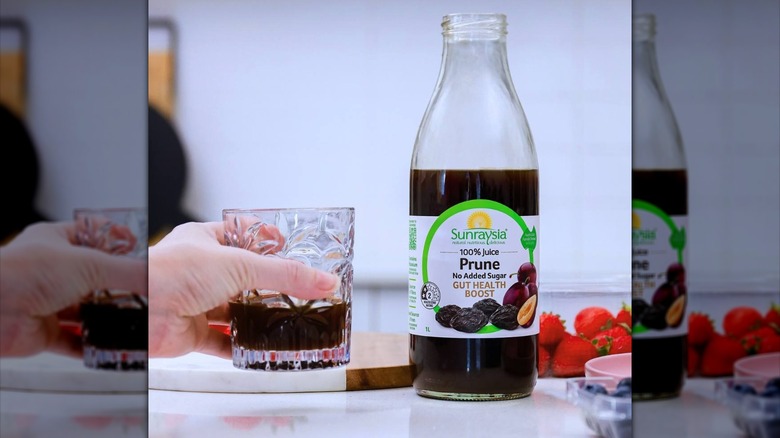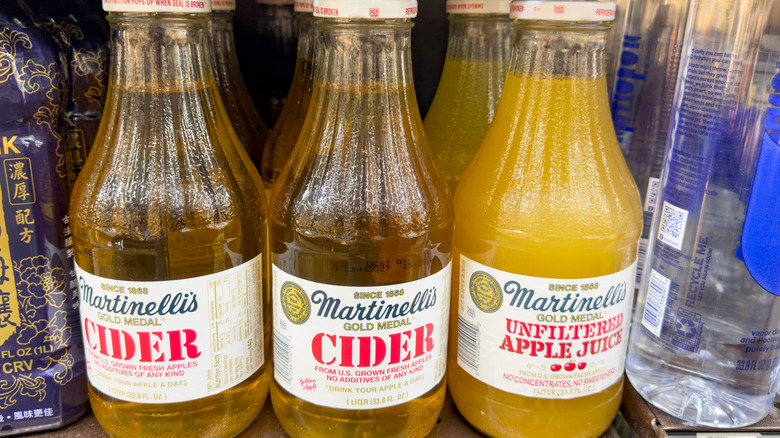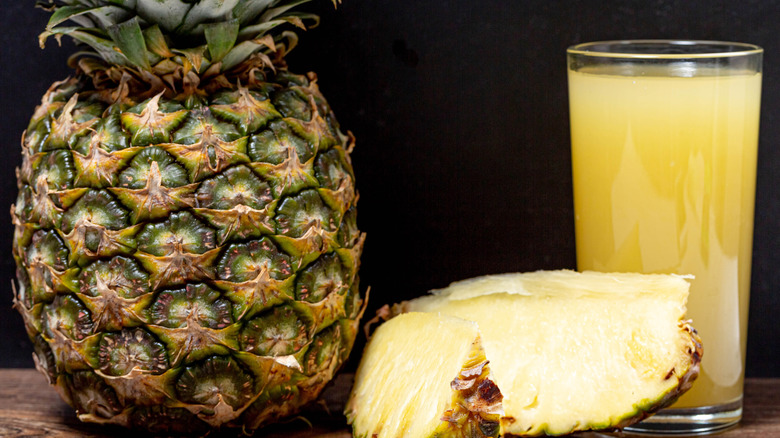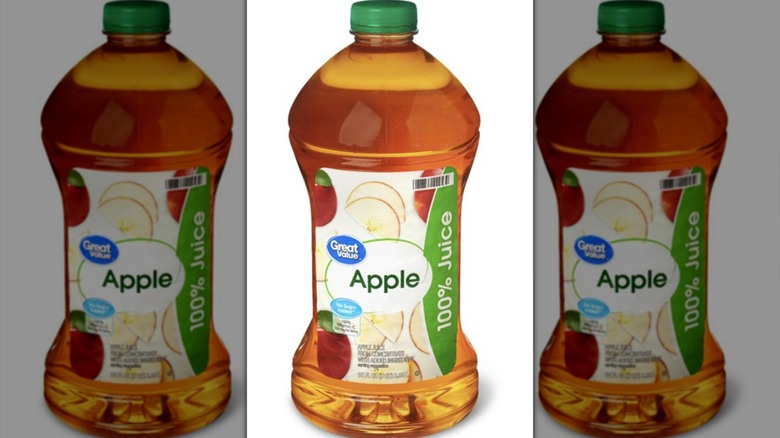The Biggest Juice Recalls Ever
We may receive a commission on purchases made from links.
When you go shopping for juice, your first thought probably isn't, "Will this make me sick?" No one wants to think that the foods they buy have ominous properties lurking within them, especially those touted as healthier options. But for the juices on this list, that's exactly what shoppers got. When juice, or any consumable, poses a threat to public health, it gets recalled from store shelves.
Federal agencies like the Centers for Disease Control (CDC), the Food and Drug Administration (FDA), and the United States Department of Agriculture (USDA) are tasked with keeping a watchful eye on food and drink manufacturers that sell products to American consumers. If items intended for consumption are manufactured in a way that is misaligned with federal regulations, it spells trouble for the production company. Bacterial contamination, mislabeling ingredients, and foreign contaminants are the three major causes behind food and drink recalls. The juice industry has seen plenty of problems at the processing stage, resulting in recalls for one of more of these reasons.
Not all recalls are equal. Manufacturers often catch the problem on their own and voluntarily issue a recall, but not always. Also, a lot of voluntary recalls wind up only scratching the surface of scary issues like widespread bacterial contamination. Scary is exactly how we'd describe the following recalls, which rocked (and continue to rock) the juice market.
Odwalla unpasteurized apple juice in 1996
When Odwalla was founded in 1980 by three Californian jazz musicians, all-natural juice wasn't the grocery store staple it is today. Odwalla's novelty factor helped it become a multi-million dollar success in just a few years. In October 1996, a tragic recall involving Odwalla's unpasteurized apple juice threatened the company's very existence.
The voluntary recall was triggered by a growing number of E. coli O157:H7 cases in the Seattle area that were linked to Odwalla unpasteurized apple juice. During an FDA investigation of Odwalla's processing plant in Dinuba, California, health and safety violations were exposed. Subpar sanitizing procedures, a lack of employee hygiene, and receiving decayed fruit from suppliers were some possible contributing factors to the E. coli outbreak. Over 66 reports of illness spread across California, Colorado, Washington, and British Columbia, 14 of which occurred in children. A 16-month-old girl in Denver died.
Odwalla began pasteurizing all of its juices, but the recall devastated the business. In 1998, the company pleaded guilty to 16 federal charges, paid a $1.5 million penalty and agreed to a five-year, court-supervised probation. It was the first time in history a widespread food poisoning outbreak resulted in criminal conviction. Coca-Cola acquired Odwalla in 2001 and sold an assortment of its smoothies and juices until July 2020, when Odwalla was discontinued altogether.
Sun Orchard unpasteurized orange juice in 1999
In June 1999, the Washington State Health Department and Oregon Health Division launched separate investigations regarding regional clusters of salmonellosis. In all reported cases, the illness was caused by the serotype of salmonella poisoning known as Muenchen. In Washington, all of the ill people had drunk fruit smoothies from a chain establishment that contained unpasteurized orange juice. Several of the ill people in Oregon reported dining at the same brunch buffet. Public health investigators traced the contaminated orange juice to Sun Orchard, a manufacturer in Tempe, Arizona.
Sun Orchard issued a nationwide recall of its unpasteurized orange juice on June 25, 1999, but the harm it was causing remained on the rise. By July 13, 1999, there were 207 confirmed salmonella cases associated with the product that spread across 15 states and two Canadian provinces. When the FDA tested orange juice samples from the Sun Orchard factory, the Muenchen serotype was one of several salmonella serotypes found. At the time, Sun Orchard unpasteurized orange juice was sold under various brands including Aloha, Earls and Joeys Tomato's, Markon, Sysco, Trader Joe's, Voila, and Zupan.
On July 23, 1999, Henry Knam, who contracted salmonellosis after drinking unpasteurized orange juice at a Father's Day brunch, died from his illness. A class-action lawsuit was filed against Sun Orchard. There were 55 claimants on the suit, including Knam. In 2002, Sun Orchard settled the suit with a $1.4 million payment.
California Day-Fresh Foods unpasteurized citrus juice in 2000
Throughout the 1990s and early 2000s, unpasteurized juice was popular in health food stores due to its minimal processing. Since the demand was there, several unpasteurized juice brands remained on the market despite well-documented food poisoning outbreaks and recalls. In 2000, California Day-Fresh Foods, which produced fresh-squeezed juice under numerous labels including the Naked Juice brand, it was on the sour side of a multi-state recall for unpasteurized citrus juice.
In April 2000, state health officials in Southern California and Nevada began investigating a surge in salmonella cases. The evidence pointed to unpasteurized citrus juices from the Naked and Ferraro brands — both were produced by California Day-Fresh Foods. These juices were also sold in Colorado, where monthly reported salmonella illnesses were nine times higher than average. The data led California Day-Fresh Foods to voluntarily recall — resulting in a slew of different juices being pulled from store shelves.
Naked's fresh-squeezed orange juice, fresh-squeezed grapefruit juice, Tangerine Scream, lemonade, Old Fashioned Lemonade, and strawberry lemonade were all affected by the recall. Ferraro's fresh-squeezed orange juice, Vons fresh-squeezed orange juice and fresh-squeezed grapefruit juice, and Trader Joe's fresh-squeezed blood orange juice were also deemed unsafe for consumption. The recall also prevented the juices from being sold in Arizona, California, Colorado, Nevada, Oregon, and Washington. Less than four months later, California Day-Fresh Foods was purchased by investment firm North Castle Partners.
Minute Maid Frozen Juice Bars in 2000
If you were a '90s child, chances are you walked out of the lunch line with a frozen juice bar on your tray at one point or another. Minute Maid was a cornerstone of the frozen juice bar market, but things got tough on the production line in 2000 when its popular juice product was recalled. The reason? Some packages might contain small plastic particles.
J & J Snack Foods Corp., which manufactured Minute Maid Frozen Juice Bars out of its plant in Scranton, Pennsylvania assured the public that although there was a packaging defect, the plastic particles were non-toxic. The true reason for the recall — which was done out of an abundance of caution — was because plastic particles in frozen juice are considered a choking hazard. The voluntary recall affected 300,000 boxes of Minute Maid product. The 12-count boxes contained a frozen juice bar flavor assortment of cherry, grape, and orange.
No injuries were reported before or after the recall, although J & J Snack Foods revealed that the packaging defect put a damper on its fiscal year sales. It's unclear whether the ordeal affected sales of Minute Maid Frozen Juice Bars long-term. What we do know is that the Minute Maid brand has sold them on and off over the years.
Bolthouse Farms carrot juice in 2006
The Georgia Division of Public Health and the CDC were on the case in September 2006 when three food-borne illnesses were reported in Washington County. The illness in question was botulism. The three individuals who became ill had shared meals together and later experienced motor nerve difficulties associated with the dangerous illness. During the investigation, public health officials noted that a 1-liter bottle of Bolthouse Farms carrot juice was amongst the items they consumed. All three individuals remained in the hospital on ventilators.
Weeks later, another suspected botulism case was reported by the Florida Department of Health, who also began working with the CDC. Again, a bottle of Bolthouse Farms carrot juice was one of the items the now-hospitalized woman had ingested. Bolthouse Farms recalled all of its carrot juice, which was sold in all 50 states, Canada, Mexico, and Hong Kong. The FDA issued a national warning against drinking Bolthouse Farms carrot juice with a best by date of November 11, 2006 or earlier.
Despite the Canadian Food Inspection Agency issuing a warning about Bolthouse Farms carrot juice on September 15, two individuals in Toronto became paralyzed after drinking Bolthouse Farms' botulism-tainted carrot juice in early October 2006. The woman who was hospitalized in Florida died. A lawsuit was filed against Bolthouse Farms after her death, and the case was settled.
Juices Incorporated in 2010
Small food and drink businesses may not have all the resources that big-name brands do, but they still have to follow the same federal regulations. Juices Incorporated, also known as Juices International and Juices Enterprises, found this out the hard way. Starting in 2008, the FDA inspected its juice-manufacturing facility and didn't like what it saw.
Juices Incorporated, based in Brooklyn, New York, specialized in traditional Jamaican beverages like cashew punch, peanut punch, and Irish sea moss that are popular throughout the Caribbean. The problem was, Juices Incorporated violated the law by not having a Hazard Analysis and Critical Control Plan (HACCP) for certain juices that are higher-risk for botulism, such as carrot and beet juices. The facility inspection uncovered further violations, including failure to safely heat and refrigerate vegetable juices, improper plumbing maintenance, and unclean surfaces coming into contact with food.
The FDA sent warning letters to Juices Incorporated in 2008 and 2009 citing the impending botulism risk and code violations. During a follow-up inspection in 2010, it was determined that the company's facility was not up to code. The FDA sought legal action to permanently shut Juices Incorporated down. A Consent Decree was issued in January 2011, requiring Juices Incorporated to stop manufacturing all food and drink. In 2012, Juices Incorporated was still distributing its juice, so the FDA warned the public not to consume the company's non-compliant products.
Hiland Dairy Orange Juice and Tampico Citrus Punch
Beverage producer Hiland Dairy had to reckon with a recall on two of its juice products in January 2018 due to an undeclared milk allergen. The products pulled from store shelves were Hiland Dairy orange juice and Tampico Citrus Punch. How did milk find its way into these beverages? Likely a case of cross-contamination.
The company is called Hiland Dairy after all, and produces milk as well as juice. The company's orange juice and Tampico Citrus Punch were shown to contain milk protein during an in-house quality control check at Hiland Dairy's Omaha, Nebraska facility. The recall affected all 1-gallon units of Hiland Dairy orange juice and Tampico Citrus Punch sold in Colorado, Iowa, Kansas, and Nebraska.
The FDA takes undeclared allergen recalls very seriously due to the potentially life-threatening risks they pose to consumers. Thankfully, no illnesses were reported in connection to this recall. Hiland Dairy's undeclared troubles didn't stop at juice though. Less than a year after the juice recall, the company issued a recall for an undeclared allergen of egg in half-gallons of whole chocolate milk.
Minute Maid drinks in 2021
Fans of Minute Maid punch got something a little extra at the bottom of the carton in 2021, which landed the company in recall territory. The unexpected ingredient: metal bolts and washers. The November 10, 2021 recall affected 7,475 cases of Minute Maid juice drinks distributed throughout Connecticut, Maine, Maryland, New Jersey, New York, North Carolina, Pennsylvania, and Virginia.
The oversight resulted in a Class II recall of Minute Maid berry punch, strawberry lemonade, and fruit punch. All units of recalled product were sold in 59-ounce cartons. The Class II designation by the FDA is given when a recalled product poses a health risk (in this case a choking hazard) in which the likelihood of permanent injury or death is low. As of December 2021, no injuries associated with the foreign contaminant were reported. The recall was terminated on March 3, 2022.
The Coca-Cola Company, which owns Minute Maid, was dealing with the same factory glitch in some of its sodas around the same time. On November 24, 2021, The Department of Defense Logistics Agency released a limited-quantity recall memo about 12-packs cans of Coca-Cola and Sprite that had metal pieces inside. The soda was stocked at military commissaries in the Southeast and the general public was not affected.
Wild Cherry Capri Sun in 2022
Spiking Wild Cherry Capri Sun with a cleaning solution seems like a barbaric punishment for naughty kids, but this wasn't Kraft Heinz's intention when it actually happened in 2022. The problem came to light that August, when the company received consumer complaints about the juice tasting like cleaner. Uh ... oops?
Kraft Heinz is a major industry player so it didn't waste any time looking into operations at the four Capri Sun factories in the U.S. Sure enough, it was determined that a cleaning solution called Clean-In-Place used to sanitize production line equipment, fell in with a batch of Wild Cherry Capri Sun at one of the factory locations. On August 12, 2022, Kraft Heinz issued a press release to notify the public of the voluntary juice recall and arrange for customer refunds. The Wild Cherry Capri Sun recall affected approximately 5,760 cases of product — or around 230,400 pouches of Capri Sun.
Sunraysia prune juice in 2024
We get it, prune juice isn't habitually flying off the shelves, but it's in demand enough to stay in production — and Australians like it. When Australian prune juice purveyor Sunraysia had a slip up in quality in January 2024, it was an urgent matter that required a swift recall. The brand didn't want any of its customers to get hurt due to undeclared alcohol in its product.
The recall came about when it was discovered that 1-liter bottles of Sunraysia prune juice had undergone unintentional fermentation, causing the presence of alcohol to develop. The undeclared alcohol posed a serious health risk to consumers who had no idea what was really in their glass. Sunraysia's parent company Sabrands Australia Management Pty Ltd launched a voluntary recall for all bottles with a best before date of December 4, 2025.
The compromised prune juice was sold at Woolworths, Coles, and health stores in the Australian states of New South Wales, Queensland, Victoria, South Australia, and Western Australia. The company also sells 1-liter bottles of cranberry juice and pomegranate juice, however, its prune juice was the only variety that was recalled. No illnesses or injury were reported from Sunraysia's accidental prune juice fermentation.
Martinelli's apple juice in 2024
Centuries-old juice brand Martinelli's recalled a lot of apple juice in 2024 due to elevated arsenic levels. Arsenic? Like ... the poison? Yes, arsenic in apple juice is an ongoing problem. Organic arsenic is a metalloid that occurs naturally in the earth's crust, so traces of it are often found in water or soil. Inorganic arsenic (the really toxic stuff), affects apple juice production if pesticides containing arsenic were previously sprayed at orchards (modern pesticides in the U.S. are arsenic-free), or if a nearby industrial site using arsenic contaminates the agricultural or manufacturing environment.
For these reasons, domestically-sold apple juice is subject to regular testing. In April 2024, Martinelli's submitted a single lot of apple juice for a routine test conducted by the Maryland Department of Health. The results showed that Martinelli's apple juice contained a higher than permitted amount of inorganic arsenic. In June 2023, the FDA set the limit for inorganic arsenic in apple juice and cider to 10 parts per billion (ppb). The inorganic arsenic level in Martinelli's apple juice clocked in at 11.6 ppb.
Martinelli's sent out a voluntary recall notice on April 16, 2024. The company maintained that the 1-liter bottles being recalled were produced in mid-2023, when the FDA's permitted level for inorganic arsenic in apple juice was 23 ppb. Still, the recall was a hefty one — 147,114 bottles of apple juice were taken off the market in 34 states.
Just Juice Organic Pineapple juice in 2024
Mold and juice go together like ... oh wait, they don't go together at all. Canadian company Just Juice is well aware of this — its organic pineapple juice was at the center of a national recall in Canada in June 2024. The juice contained mold.
Mold contamination in juice is dangerous. Some individuals can experience allergic reactions or respiratory problems after consuming moldy food or drinks. If storage conditions allow mold to thrive, it can produce mycotoxins — toxic chemical compounds that can cause acute food poisoning or even long-term damage to the immune system. Also, drinking moldy juice is gross.
It is unclear how many units of Just Juice Organic Pineapple Juice were seized in the recall. Just Juice distributes its products all throughout Canada, so the recall likely dealt a substantial blow to the company's operations. Just Juice's Organic Pineapple Juice has returned to select markets, but it's one of many organic pineapple juice options to choose from.
Apple Juice in 2024
One of the biggest apple juice recalls in recent memory, which has hit 26 states, plus Washington, D.C. and Puerto Rico, remains ongoing as of October 2024. The manufacturer behind the recall is Refresco Beverages, a 25-year-old, international mega-producer of juices with over 70 production facilities dotting the U.S., Europe, and Australia. In August 2024, operations in the U.S. hit one snag after another. It started with elevated arsenic levels in the apple juice at Walmart.
In August 2024, Refresco became aware that tested samples of Walmart's Great Value apple juice revealed an inorganic arsenic level of 13.2 parts per billion (ppb). As of June 2023, the FDA prohibits the amount of inorganic arsenic in apple juice and apple cider to exceed 10 ppb. On August 23, 2024, Refresco initiated a voluntary recall for Great Value 8-ounce bottles of apple juice sold in packs of six. By mid-September, the number of affected products had rapidly expanded.
Great Value's 96-ounce bottles of apple juice were looped into the recall, as were apple juices from brands Clover Valley, Market Basket, Nature's Nectar, Nice!, Solevita, Tropical Delight, Weis, Urban Meadow, and Wellsley Farms. A total of 1414,298 cases have been affected by the Class II recall. Children with prolonged exposure to inorganic arsenic can develop neurological problems while adults face an increased risk of cardiovascular disease and certain cancers.
